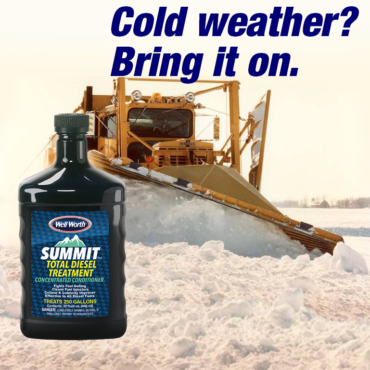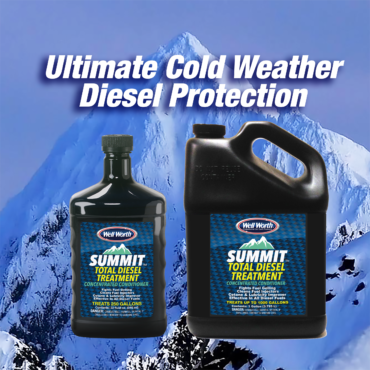Winter can have a significant impact on diesel fuel. Here are few factors to consider when deciding which diesel additive you need:
Diesel Icing
Diesel icing is a problem that can occur when water droplets freeze in the fuel system. This can cause blockages in the fuel lines and filters, which can restrict fuel flow and cause the engine to stall or fail to start. The most common reason for diesel icing is simply weather: during times of high humidity there will be more water droplets present in the air. If the temperature then drops below freezing, the water droplets in the air can turn into ice in the fuel system. Additionally, if the fuel system is not properly maintained the risk of diesel icing increases. This is especially true if the diesel fuel itself is contaminated with water or other impurities, which can then accumulate in the fuel system. The best way to clean and maintain your fuel system is with the regular use of a fuel additive such as INJECTOR PRO CLEAN™ that will circulate through the entire fuel system including the intake manifolds, injectors, combustion chambers, turbochargers and coolers.
Diesel Fuel Gelling
Diesel fuel begins to gel at temperatures below freezing. Below 32 degrees Fahrenheit, wax crystals will start to form and clump together in the fuel, causing it to thicken and become more viscous. This can make it difficult or impossible for the fuel to flow through the fuel lines and reach the engine, potentially causing the engine to stall or not start at all. The exact temperature at which small wax crystals begin to form is called the cloud point.
The cloud point of diesel fuel is dependent on its composition, but typically ranges from 14 to 21 degrees Fahrenheit depending on the fuel’s composition. Cloud point is an important factor to consider when storing and transporting diesel fuel in cold temperatures, as it can indicate when the fuel is at risk of gelling. To prevent diesel fuel from reaching its cloud point, be sure to always store it in a warm, insulated area to prevent it from cooling down too much. In winter, you can treat your fuel with an additive such as SUMMIT™ which is designed to prevent gelling, clean the fuel injectors, increase cetane, add lubricity and remove water.
Using diesel fuel with a lower cloud point can help prevent gelling in cold temperatures, but it may not be suitable for use in warmer climates. It’s also important to know that different diesel fuel specifications may have different cloud point requirements. Diesel fuel gelling can occur at temperatures above the gelling temperature point, depending on the fuel’s composition, the presence of impurities, and the condition of the fuel system.
Diesel Thickening
Winter can have a significant impact on diesel fuel, as the colder temperatures can cause the fuel to thicken and become more viscous. The pour point is the lowest temperature at which the fuel will still flow. If the temperature drops below the pour point, the fuel will become too thick to flow and will not be able to reach the engine. The temperature at which a diesel fuel will start to solidify and clog a fuel filter is called the cold filter plugging point, or CFPP. The higher the CFPP, the more likely the fuel is to cause filter plugging in cold temperatures. Some fuel additives, such as FREEZE FLOW™, are specifically designed to lower the CFPP while eliminating water and improving lubricity.
Water Accumulation
Cold temperatures can also cause water to condense and accumulate in the fuel tank and lines, which can lead to issues such as corrosion and microbial growth. You can remove excess water from your tank while cleaning the fuel injectors and pumps by using ONE 4 ALL WITH LUBRICITY™.
Solutions
To mitigate these problems, it’s recommended to use winter diesel fuel, which is formulated to have a lower pour point and cloud point, and to use fuel additives which help prevent gelling. And you should always keep an eye on the weather conditions and take extra precautions when the thermometer drops below freezing and the humidity is high.




6 Comments
doug calverley
Any products for ashpheltene in diesel fuel …Becoming a huge problen in fuel
Elizabeth Poyer
Great question, Doug! Yes, Summit, One 4 All and Injector Pro Clean all include a cleaning agent that will treat asphaltene.
Jim Warner
Did the contents of Summit change- It does not work as well anymore
Elizabeth Poyer
Hi Jim, thanks for the feedback. Would you mind giving an example of how it isn’t working as well for you?
Jim Warner
Well, lets start with our fuel gelling up during the last cold snap. Word on the street is you guys are no longer using the same company to make your fuel additives. Wish I could find that company??
Elizabeth Poyer
Jim, I’m sorry that your experience was not as expected. I’d like to investigate this further. Please call our Customer Service Team at 1-716-597-0214 so that we can get to the bottom of this.